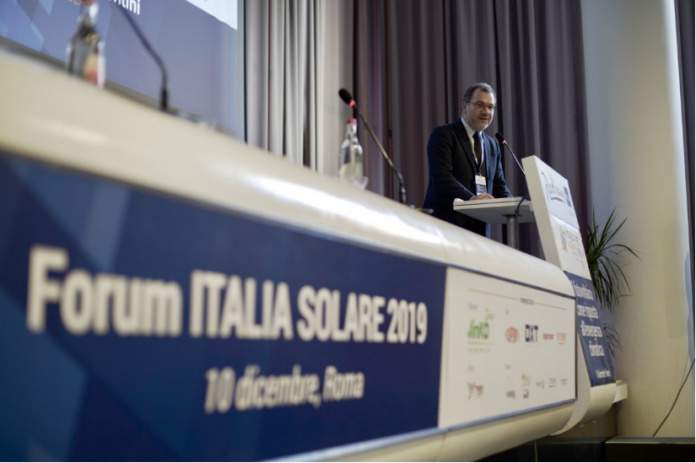Italian solar companies have asked the government to find a long-term solution to the current mismatch between supply and demand for solar modules and, to a lesser extent, for batteries.
Paolo Rocco Viscontini, president of trade association Italia Solare, has spoken to pv magazine about the vital role played by the national ‘super bonus‘ tax deduction in supporting Italian PV.
“Right now, incorrect management of the super-bonus would do great damage,” he said. “By improper management, I mean a stop. What will be next? We need to know soon and we need long-term planning. Let it be a gradual decrease; let it be linked to income levels, but let it continue.”
The super bonus offers tax deductions worth 110% of the purchase price of systems including solar panels and home storage, with the deductions applied across subsequent tax years. PV arrays and batteries are eligible as long as they are part of more extensive projects which improve the energy efficiency of buildings.
The measure was introduced in May last year and has been extended throughout next year, for condominiums, and to June 30 for other buildings, with the chance to extend to the end of next year provided work has reached a sufficient stage by the end of June. Public housing renovation projects can claim the super bonus until June 30 2023, with an option to extend to the end of 2023.
Super bonus
Viscontini said he believes it will be impossible for Rome to further extend the super bonus at the 110% level and suggested a less generous scheme could provide support over a longer period and prove more sustainable for Italian solar. “The mechanism is working,” he said. “What we insist on is that there be a multi-year mechanism. And this is the only way for all operators to invest, to structure themselves, to hire. If there is a deadline after one year, it will just be all short-term work, without consequences on the job market.”
Demand for the super bonus has been such that residents have reported difficulty finding companies to carry out renovations, particularly for smaller projects in marginal parts of the country.
The Italia Solare president underlined the importance of regional planning, saying: “We need to hold regions accountable. We need to make subdivisions according to what has already been installed, the conformation of the territory, the need for energy flows in the networks … how many [solar systems are needed] on rooftops and how many on the ground? The emergency is real.”
Red tape
While issuing faster permits at a regional level is a critical issue for Italian solar, Viscontini said the nation should be thinking about investing in more than just efficiency measures – it should consider PV manufacturing too.
“We need to think about an Italian industrial supply chain,” he said. “Why is there no serious project? The issue is that we don’t feel the emergency. We should have done investments over the last seven years. We slept. Now we have to go and get raw materials from someone. Buy Chinese companies. Buy raw materials, and do it today!”
And the trade body chief warned against being distracted by emerging low-emission energy technologies, such as modular nuclear reactors. “We have the solutions,” he said. “We need to be pragmatic. Let’s stop speaking about nuclear.”
With solar module prices having risen at least 30% in the last four months, Viscontini warned the situation could worsen as rampant demand for PV in China could soak up the output of raw materials supply as soon as new production capacity comes online.
Soaring demand
“There is definitely a bottleneck for several materials,” said the Italia Solare president. “The most important material, the one that has had the most significant effect, is polysilicon. There is some new capacity coming online, large plants in China which we thought, until a few days ago, might be the solution to get back to lower prices. Then there was the statement from the Chinese government that they were going to [develop solar generation capacity] in the 100 GW range. Today total [solar] production is 200 GW per year. What the [Chinese solar] producers are telling me is: ‘Here, there will be such a strong domestic demand that we risk not being able to [return to] a normal situation even next year.’”
The situation in the world’s biggest solar market is set to leave Italian developers even more dependent on the stock sitting in warehouses and, according to Viscontini, new megawatt scale solar projects are already facing delays until the spring for module delivery and “sometimes even those [projects] already agreed on will be delayed.”
On inverter supply, at least, Viscontini was more positive, even as demand for the devices – and for batteries – has risen on the back of the extended tax incentive. “With the super-bonus, 80-90% of inverters are made with batteries,” said the Italia Solare chief.
Batteries
For batteries, though, the supply and pricing situation remains less clear because electric vehicle demand is accelerating. “So far, battery prices have been stable, but in the next few months you can expect at least a 20% increase,” said Viscontini.
With logistics costs, and in particular shipping charges, rising to punitive levels, solar price inflation appears inevitable.
“We have news on multiple fronts and they are converging,” added Viscontini. “A container a year ago was at $1,500 [€1,330], now it’s traveling around $20,000 [€17,700], and that impacts modules and inverters.”






